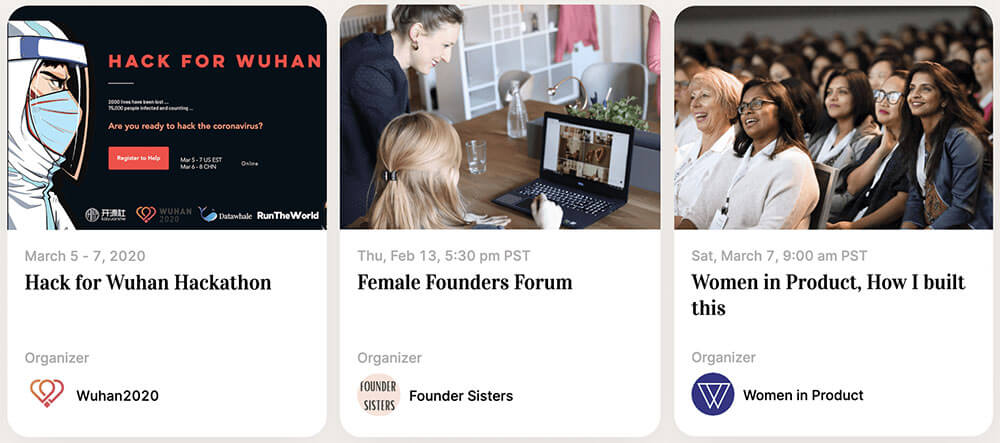
Run the World co-founders Xiaoyin Qu and Xuan Jiang, former Facebook employers. Their new platform will host an international hackathon (lower left) to help those suffering from COVID-19.
Takeaways from Run the World, an app-based events platform:
- Organizers looking to move their events online because of the COVID-19 outbreak can use Run the World.
- The platform will livestream “Hack for Wuhan,” an international hackathon convened to create tech solutions for those affected by COVID-19 in Wuhan.
When Xiaoyin Qu dropped out of Stanford Graduate School of Business last year to start an event tech company, her inspiration was the “life-changing” experience her mother, a pediatric neurologist in China, had when she traveled to the U.S. for her first international medical conference, Qu told Convene in a phone interview.
Her mother considered the connections she made at the event to be invaluable, she told Qu, but she couldn’t see herself attending another conference any time soon, because of the expense and the time away from work it required.
Less than a year later, Qu, a former senior product manager at Facebook, and cofounder Xuan Jiang, who worked as a technology lead for Facebook events, ads, and stories, have created an alternative: Run the World, an app-based meeting and event platform which launched Feb. 27. Run the World is arriving just as COVID-19 is accelerating interest in online events, and Qu has heard from several event announcers looking to move events online because of the outbreak, she said. Run the World, she added, will waive set-up fees for events moving online due to the virus.
Run the World is staffed by executives and veterans from Facebook, Instagram, and Amazon, Qu said, and is backed by the Silicon Valley venture capital firm Andreessen Horowitz, an early investor in such companies as Skype and Airbnb, among others.
The startup, which is based in Silicon Valley, has operated for the last four months in stealth mode, inviting companies to try out a beta version of its software, Qu said. During that time, organizers and attendees from 30 countries used the platform for events ranging from a conference organized as a fundraiser by an elephant conservation reserve in Laos to the “Fertility Empowerment Summit,” a global event providing information about egg-freezing options for women.
Next week, it will host its largest event yet: Wuhan2020, an open-source community of more than 3,000 developers, will use Run The World to host Hack for Wuhan, an international hackathon convened to create tech solutions for those affected by COVID-19 in Wuhan — representing collaboration at a scale “that hasn’t been possible for physical hackathons in the past,” Qu said. (Read our update about Hack for Wuhan’s winning hacks.)
The crisis may be speeding the adoption of online meetings right now, Qu said, “but we believe that it consistently will be a trend, allowing more people to organize meetings and more people to participate in them.

Run the World co-founders Xiaoyin Qu (left) and Xuan Jiang, are former Facebook employees.
Start for the Startup
From the beginning, company founders have been guided by the drive to make digital experiences more personal. When her mother attended an international conference in Chicago in March for the first time, Qu said, in addition to learning about the latest research and treatment plans, she met a physician from Dubai whose patient had a rare condition similar to one of her own patients. But attending was such an ordeal — taking two weeks off work, applying for a U.S. visa in Beijing, traveling from Qingdao to Chicago, and expensive flights and hotels — “it posed such a huge barrier.”
The wheels began to turn for the cofounders, whose work at Facebook was focused on video and events. “We have mobile, we have video, we have live,” Qu said. “We can at least make it easy for people like my mom to attend conferences more regularly.”
As Qu and Jiang set out to develop the platform, they first spent time trying to understand the value of events, tapping resources including PCMA’s CMP online course and “about 12 conferences,” Qu said. Two things stood out, she said. “Events are valuable when they bring relevant people together and enable them to interact at the same time. We wanted to make sure we had those two fundamental elements — relevant people and the ability to meet at the same time and have a back-and-forth exchange.”
When you’re meeting a group of relevant people, “you have trust in them, you want to connect with them, and you can learn from them,” Qu said. And getting relevancy right between individuals is something that technology can help with, she said. “One problem we see at physical events sometimes is that you don’t know who is interested in having a conversation with you, and you don’t know who is relevant for you,” she said. “Or you may feel shy and you’re kind of just wandering around the conference room, and don’t know which one to reach out to.” In Run the World’s model, attendees fill out user profiles and can be matched with like-minded attendees for conversation, Qu said. And they have to be together at the same time, Qu said.
Organizers can use Run the World to livestream keynotes and panels of up to eight speakers, but “our goal is not only to make seamless video connections,” Qu said. With features like a “cocktail party” that sets up brief, one-on-one interactions, and “fireside chats,” that allow participants to respond to conversations between presenters, “we’re providing excuses for participants to interact with each other.”
Events “are so powerful because they create opportunities for people to go really, really deep, and have meaningful relationships,” Qu said. “That’s something that you can’t do today in the online world. That deep, meaningful interaction does not exist. I came from Facebook, so I know — the likes and comments and those kind of things, where you go and follow an account — those are not real social interactions. It’s just a shallow thing.” The world “we imagine and want to pave the way for is one in which we can have the ease of use, just like Facebook or Instagram, and there are no physical limits, but at the same time we can have very deep, meaningful relationships.”
Run the World is not a replacement for meeting in person — the goal should be to facilitate more — instead of limiting — face-to-face interaction, she said. “We don’t want to live in a world where we don’t meet personally anymore, and only use virtual. I’m not a ‘live in the virtual world forever’ kind of person.
“The right approach, I think, should be creating more occasions and events that otherwise would not exist” because of barriers like international travel or frequency, she said. Run the World could host a meeting for 10,000 people, but it’s not just for big events — “this is a great way to add smaller events,” Qu said.
Why the name Run the World? It is, in fact, partly a nod to the Beyoncé song of the same name, “Run the World (Girls),” Qu said. “It is about empowerment, right? But the second reason is that I think that there are no physical limits anymore [because] we have this. Basically, the whole world can be run easily.
Barbara Palmer is deputy editor of Convene.
What Events Professionals Need to Know About COVID-19
PCMA has created a COVID-19 resources page to help event professionals find reliable information about the outbreak and to share events industry-related resources to ensure they are prepared.
